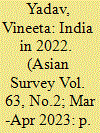| Srl | Item |
| 1 |
ID:
190030


|
|
|
|
|
| Summary/Abstract |
India continued its recovery from COVID-19 in 2022. The Omicron strain was less lethal than previous waves and consequently had a smaller economic footprint. The economy began rebounding, with trade and foreign direct and portfolio investments recovering to pre-pandemic levels. India remained one of the fastest-growing economies in the world in 2022. However, it suffered very significant setbacks to its democracy, with increased attacks on civil and political liberties and human rights, and on its institutions, by BJP-led governments at the center and in the states. India effectively managed foreign policy challenges stemming from the Ukraine–Russia conflict, incursions into Indian territory by China, and the Islamophobic rhetoric of its own party leaders. Overall, 2022 was marked by a slew of BJP victories in six out of seven states and by the negative consequences of the BJP’s political strength for Indian democracy.
|
|
|
|
|
|
|
|
|
|
|
|
|
|
|
|
| 2 |
ID:
176134


|
|
|
|
|
| Summary/Abstract |
Political families are common across many countries in Asia, including Pakistan. Politicians from political families (PPFs) make decisions with the goal of maximizing the political prospects of the entire family, in contrast to non-PPFs, who maximize their individual political self-interest. This changes the impact they have on their country. Scholars find that the presence of PPFs is associated with significantly worse development and governance outcomes, including in Pakistan. However, we know much less about their impact on political outcomes. In this paper, we use original data from a 2018 systematic national survey of about 150 Pakistani politicians to investigate PPFs’ support for key democratic institutions and practices. We find that compared to non-PPFs, Pakistani PPFs are significantly more supportive of instrumentally useful institutions and practices such as free and fair elections, an independent judiciary, and a free media, but no different in their low level of support for human rights.
|
|
|
|
|
|
|
|
|
|
|
|
|
|
|
|
| 3 |
ID:
192227


|
|
|
|
|
| Summary/Abstract |
Given their citizens’ religiosity, the presence of religious parties, and the salience of religion in the politics of India and Pakistan, it is likely that politicians in both of these countries vary considerably in how religious they are. How do these differences influence their political and policy choices? We know surprisingly little about this question. This paper uses data from survey experiments fielded to politicians in India (in 2019) and Pakistan (in 2018) to examine how religiosity is correlated with politicians’ risk-taking behaviors. Given that research finds they are correlated in citizens and the ubiquity of both risk and religion in politics, understanding this relationship is important. The experimental data reveal that in both countries highly religious and less religious politicians make very different choices on a risky policy decision. Highly religious politicians are risk-seeking in India but risk-averse in Pakistan. While the less religious politicians approximate rational actors, the highly religious politicians violate both rational actor and prospect theory decision-making models.
|
|
|
|
|
|
|
|
|
|
|
|
|
|
|
|